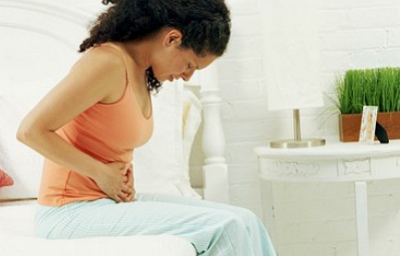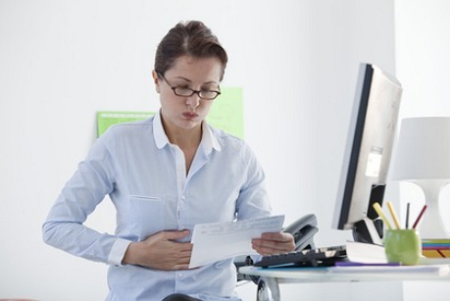Constipation During Pregnancy

Contents:
- Reasons
- Constipation During Pregnancy: What Are the Symptoms?
- Relief and Treatment
- What is the Wrong Way to Treat Constipation During Pregnancy?
Pregnancy and Constipation
One of the most common problems women face during pregnancy is difficult bowel movement or, to put it simply, constipation. Every two out of three pregnant women complain about constipation. Also, every third woman who had a child complains about constipation after giving birth.
Reasons
- During pregnancy, and especially in the second half, the growing uterus compresses the intestine. This disrupts the outflow of blood and leads to venous stasis in pelvic veins. As a result haemorrhoids can develop (a dilation of rectal veins) which eventually causes constipation.
- The human body produces special nutrients that stimulate intestinal contractions. During pregnancy, intestinal muscles are less receptive to this stimulation. Nature ruled wisely here, as the intestines and uterus have a common innervation, the high active peristalsis could cause contractions to start and jeopardies the pregnancy. Unfortunately this defensive mechanism has a side effect, constipation.
- Constipation can be caused by hormonal changes in a women’s body. In particular, the pregnancy hormone progesterone can slow peristalsis down.
- Everyone knows that pregnant women can be emotionally unstable, easily stressed, and suffer from baseless fears. Modern medicine believes that constipation is often caused by stresses and other emotional factors; it especially concerns pregnant women. After giving birth, women have less constipation, possibly because their emotional state improves rapidly.
- Allergies and autoimmune disorders can also affect ability to go to the toilet.
Constipation During Pregnancy: What are the Symptoms?

Constipation means that your bowel movement doesn’t happen for more than three consecutive days. Constipation during pregnancy might be accompanied by the feeling of incomplete bowel emptying, abdominal pains (often in the left side of the body). When the pregnant woman has haemorrhoids, the stool can be streaked with blood. Some women might experience intestinal heat and itching around the anus. Another symptoms include sickness, bitter taste in the mouth, bloating, and stomach rumblings.
Relief and Treatment
Diet is one of the remedies for constipation. The intestine needs to receive a lot of fibre. Fibre is not digested but bulks up stool and thus helps the bowel emptying. The high-fibre diet should include carrots, cucumbers, tomatoes, beetroot, zucchinis, pumpkin, apples, wholemeal bread, and dried fruits. Usually fermented milk products such as kefir and prostokvasha have a positive laxative effect. Kvass, a fermented beverage made of black or rye bread, and sour schi soup can be of help too. Vegetable fats are good as well, as when splitting they produce fatty acids which stimulate peristalsis.
Infusion is the best way to take dried prunes. Here is a recipe: mix 100 g prunes and two glasses of boiling water, add a bit of sugar, let it be infused under a lid for 10-12 hours. Do that in the evening so you can take the infusion on the next day. You should drink half a glass of the infusion before meals and eat the fruits. Another remedy is to drink a glass of cold water before eating. Adding some honey will help you enjoy that more.
Certain foods can make you constipated. You should avoid strong tea, black coffee, cacao, chocolate, white bread, semolina, mealy and slimy soups, and blueberries. In case of extreme stomach bloating you can drink infusions of camomile, peppermint, caraway seeds, dill and take carbolenum (activated charcoal). Always ensure that a doctor supervises the intake amount for carbolenum. Try to avoid standing for too long and lifting heavy weights. Do pelvic floor muscles exercises, which will stimulate peristalsis.
What is the Wrong Way to Treat Constipation During Pregnancy?
Physical therapy methods (such as electrophoresis with novocaine, inductothermy, electrical stimulation, Bernard's diadynamic currents, amplipulse therapy) are usually employed to treat constipation. However those methods are not recommended for pregnant women for many reasons. Firstly, physical therapy can stimulate the contractions in the uterus. Secondly, that sort of treatment can increase the sensitization in the body, e.g. the negative change in how your body reacts to different stimuli. Finally, physical therapy can affect the fetal development.
Taking laxatives is not recommended due to the risk of a spontaneous abortion. This is especially risky in the first trimester if a threatened miscarriage was diagnosed. It concerns both strong laxatives like magnesium sulphate, Carlsbad salt, castor oil and mild laxatives, such as buckthorn, rhubarb, and senna. Medications cafiolum and busacodyl can cause stomach cramp-like pain and running stool. So the best way to tackle constipation is to eat rich-fiber foods.
Can I use suppositories against constipation during pregnancy and what?